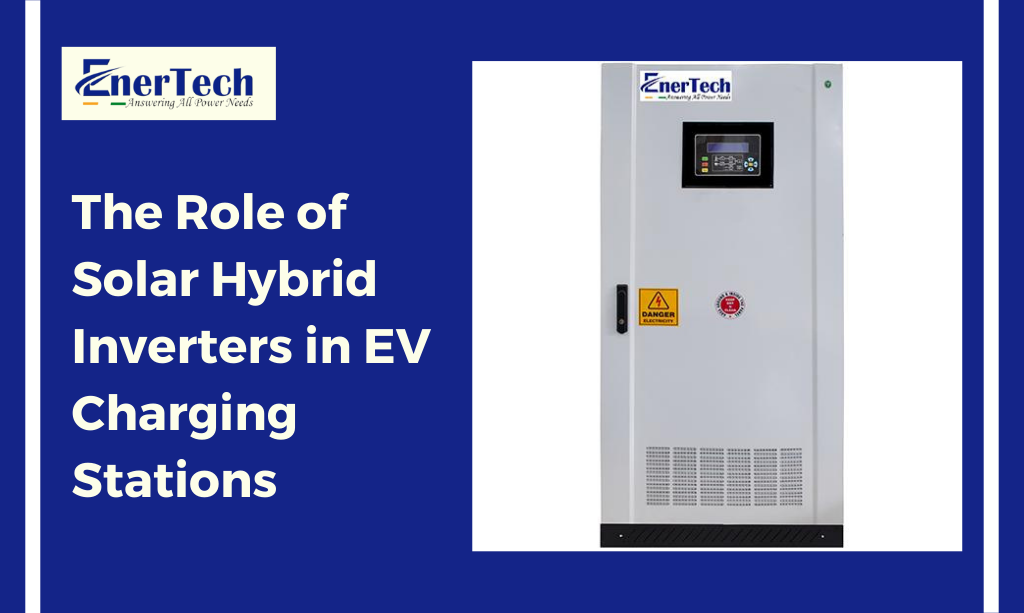Electric vehicles (EVs) are helping the world reduce its dependence on fossil fuels by electrifying mobility. But what about the generation of electricity? Aren’t rising energy concerns and costs an equally critical aspect? Yes, they certainly are – thanks to solar energy that can help us combat the energy needs of electric vehicles! We can charge EVs through solar-powered EV charging stations. Solar hybrid inverters are a significant step in this regard, and companies like EnerTech, are amongst the pioneers across this sector. So, let’s look at the role of solar hybrid inverters in EV charging stations.
What is a Solar Hybrid Inverter?
At the outset, let’s understand the role of a solar hybrid inverter. It is a device used in solar power systems that combines the functionalities of a solar and battery inverter. It primarily works towards managing the power that solar panels generate and which is stored in batteries. A solar hybrid inverter converts DC (generated by solar panels when sunlight hits them) electricity into AC, which then powers household appliances.
When the solar panels generate more electricity than required, the batteries store the excess power. It is here that the role of a hybrid inverter comes into the picture. It helps charge the batteries and ensure they are topped up in times of the availability of excess energy. Thus, with the help of storage batteries connected to the inverter, a hybrid solar inverter ensures an uninterrupted power supply. In the event of power failures, the batteries work as an inverter and provide backup.
Modern solar hybrid inverters also come equipped with intelligent energy management systems, which optimize the distribution of solar energy between immediate consumption, battery storage, and, if connected, the grid. They can prioritize powering essential loads during peak sunlight hours, efficiently manage battery charging, and even regulate energy usage to reduce electricity costs. Many models offer real-time monitoring and diagnostic features, allowing homeowners to track energy production and consumption patterns easily. By integrating these advanced functionalities, hybrid inverters not only provide reliable backup power but also enhance overall system efficiency, making them a versatile and future-ready solution for residential and commercial solar installations.
Now that we’ve seen what a solar hybrid inverter is, let’s look at the multi-dimensional role of solar hybrid inverters in electric vehicle charging stations.
The Multi-Faceted Role of Solar Hybrid Inverter in EV Charging Stations
Here’s how solar hybrid inverters play a transformative role in EV charging stations, helping the world power EVs optimally and without depending as much on the grid.
-
Energy Efficiency Optimization
Solar hybrid inverters enable EV charging stations to leverage solar energy. As mentioned above, they convert DCs that solar panels generate into AC to power EVs. Thus, instead of conventional electricity, EV charging stations (the numbers of which will scale up considerably soon) use solar power. The result is reduced dependence on the grid and minimized carbon footprint in the long run.
-
Independence from the Grid
With a solar hybrid inverter, an EV charging station can operate independently of the grid to at least some extent, although not fully. The government is working towards increasing the number of EV charging stations across various urban and remote regions of the country. Installing solar hybrid inverters can help reduce the need for traditional electricity. While benefitting the urban areas, it can prove advantageous for rural areas where grid access remains restricted or is unreliable. Switching to solar power can help remotely located stations provide much of the electricity required through solar energy.
-
Sustainability Advantages
Currently, most EV charging stations run on conventional electricity. That nullifies the impact of fossil fuel savings, as, on the other hand, we’d continue to use traditional electricity somehow. However, harnessing solar energy can help EVs reduce their environmental impact. It is simple to understand how. Solar energy is a clean and renewable form of energy that doesn’t emit any harmful or toxic gases or pollutants. Thus, integrating solar hybrid inverters can help make EV infrastructure eco-friendly.
-
Increased Scalability
Solar hybrid inverters offer scalability and flexibility to EV charging stations. Additional solar panels and batteries can be easily integrated into the system as demand grows, allowing stations to expand their capacity without extensive infrastructure upgrades. This scalability ensures that EV charging infrastructure can keep pace with the increasing adoption of electric vehicles.
-
Commercial Benefits
Adopting solar energy infrastructure involves a one-time cost. However, it helps save money in the long run (which is as good as earned!). The excess energy that panels generate can be stored in batteries or given back to the grid, thus curtailing operational costs to a significant extent, especially in the long run.
EnerTech intends to complement the government’s efforts towards promoting sustainability through EVs. We manufacture solar hybrid inverters that help support EV infrastructure by reducing the latter’s dependence on conventional electricity and optimizing the use of solar energy. Our range of solar inverter products includes Solar Hybrid Inverter 1Ph: SunMagic and Solar Hybrid Inverter 3Ph – REeFI. The products pack a value proposition through efficient features and functionalities that help the industrial world and country as a whole step closer to sustainability. Please email us at sales@enertechups.com to explore more about services and products.
Frequently Asked Questions
Q. What is a solar hybrid inverter?
A solar hybrid inverter converts DC power from solar panels into AC power. It can also store excess energy in batteries and derive power from the grid when required.
Q. What are the benefits of a solar hybrid inverter?
Some advantages of solar hybrid inverters include the following.
- Increased energy independence through solar power use and the utilization of energy stored in batteries
- Using backup power during grid outages by taking energy from battery storage
- Reduced dependence on fossil fuels and conventional electricity
- Lowered electricity bills in the long run
Q. How does a solar hybrid inverter work?
It converts DC electricity that solar panels generate into AC electricity for use. Excess electricity generated during the peak hours can be stored in batteries for later use or resent to the grid. Solar hybrid inverters switch efficiently between battery power, solar power and grid power based on the availability and need for electricity.
Q. How is the size of the solar hybrid inverter decided?
It is decided based on factors like the solar panel system’s size, energy consumption, and if you want backup to tackle electricity cuts. However, it is a complex math that you should let an expert like EnerTech deal with.
Q. How long do the solar hybrid inverter batteries last?
Factors affecting the lifespan of batteries in solar hybrid inverters include usage patterns, maintenance, and battery chemistry. Usually, solar hybrid inverters use lithium-ion batteries and can last up to 6-15 years, depending on how well you maintain it.




